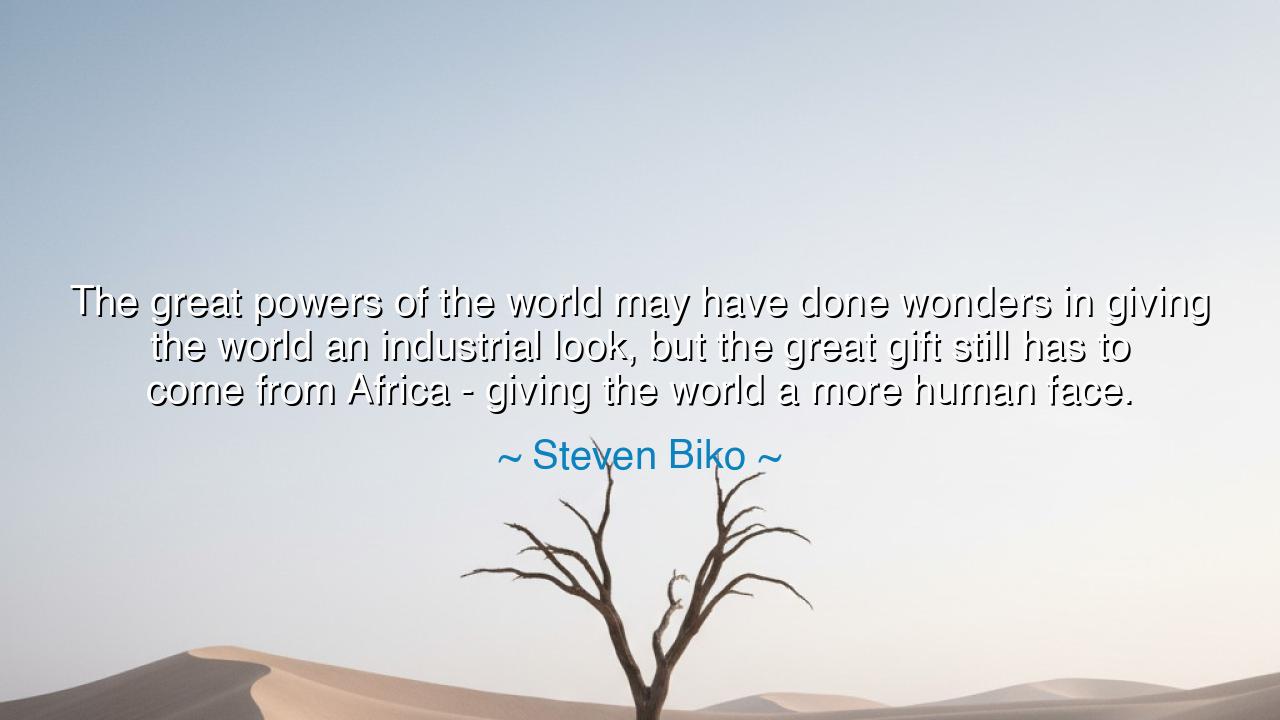
The great powers of the world may have done wonders in giving the
The great powers of the world may have done wonders in giving the world an industrial look, but the great gift still has to come from Africa - giving the world a more human face.






“The great powers of the world may have done wonders in giving the world an industrial look, but the great gift still has to come from Africa—giving the world a more human face.” Thus spoke Steven Biko, the prophet of Black Consciousness, whose words were not merely written upon the sands of time, but carved into the heart of human destiny. His voice rose not from comfort, but from struggle; not from the triumph of wealth, but from the furnace of suffering. In these few words lies both a rebuke and a prophecy—a call to remember that even as machines hum and cities glow, the spirit of humanity has grown dim, and that spirit must be rekindled by those who remember what it means to be human.
In the age of steel and smoke, the great powers of the earth—those nations that forged empires upon the anvil of industry—clothed the world in progress. They built ships that sailed without wind, towers that pierced the heavens, and machines that conquered both distance and time. Yet beneath the noise of engines, the human heart grew lonely. The industrial look brought light to the night, but not warmth to the soul. It built great monuments, but often upon the bones of the forgotten. And so, while the world became brighter, it did not necessarily become kinder. Biko saw this clearly: that the age of industry must be followed by an age of humanity—and that Africa, cradle of the first breath of man, must be the one to breathe compassion into the world again.
To understand his words, one must look upon the story of Nelson Mandela, who, after twenty-seven years in prison, stepped into the light without bitterness. In a world that had given him chains, he offered forgiveness. In a land divided by cruelty, he built unity. Mandela’s act was not industrial—it did not produce wealth or invention—but it produced healing, which is rarer and far more needed. This is what Biko foresaw: that the gift of Africa is not in the steel of its railways or the gold of its mines, but in the warmth of its spirit, the depth of its community, and the boundless endurance of its love.
Africa, he believed, was not destined to imitate the powers of the West but to redeem them. For when the world becomes obsessed with machines, someone must remember the value of man. When greed consumes nations, someone must teach generosity again. Africa, with its songs that rise from the soil and its people who dance in the dust yet radiate joy, carries within it the remembrance of the sacred—that life is not measured by what we own, but by what we share. In this remembrance lies its great gift: the power to restore to humanity the human face it has lost.
Let us not imagine this as mere poetry. The world today trembles with loneliness, division, and spiritual hunger. We have learned to speak across oceans, yet we have forgotten how to speak heart to heart. We have built smart machines, but often act foolishly with one another. What Biko offers is not nostalgia—it is a direction. He calls each soul to awaken the human within, to resist the coldness of modern progress with the warmth of empathy, to replace domination with dignity, and to remember that no nation, no matter how mighty, can endure without compassion.
The lesson, then, is this: do not seek greatness in what you build, but in how you love. Be the one who looks into another’s eyes and truly sees them. Build not only cities of concrete, but communities of care. When you labor, do so not only for profit, but for the betterment of the human spirit. Let your knowledge serve kindness; let your power serve peace. For the age of machines may have conquered the earth, but the age of humanity will save it.
So, my child, when you hear Biko’s words, hear not a lament, but a summons. The industrial look has shaped the outer world; now we must shape the inner world. Each act of kindness, each moment of courage, each refusal to dehumanize another—these are the bricks of a new civilization. And perhaps, when history’s fires cool and its towers fall to dust, what will endure will not be the engines or the empires, but the simple, shining human face that Africa once promised to give—and that every one of us can help restore.
For the spirit of Africa is not bound by geography. It is the song of the heart that remembers compassion, the rhythm of life that beats beneath the noise of progress. Carry that rhythm in your breath. Walk the earth as one who knows that humanity is the greatest invention of all. And when the world grows weary of its own brilliance, may your light remind it once again what it means to be truly human.






AAdministratorAdministrator
Welcome, honored guests. Please leave a comment, we will respond soon